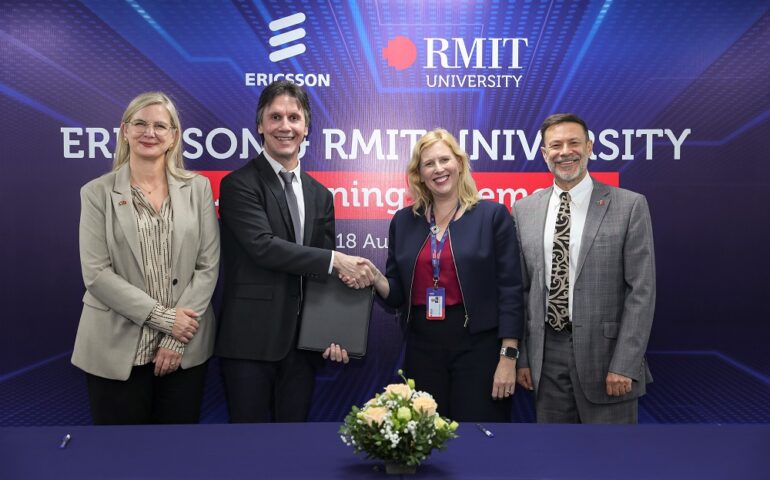TL;DR:
- Ericsson and RMIT University collaboratively establish an AI Lab in Vietnam.
- This initiative extends from their ongoing 5G education partnership.
- The lab focuses on integrating AI into Industry 4.0 fueled by 5G technology.
- It aims to create and implement AI solutions across sectors like energy, manufacturing, and transport.
- The collaboration enhances digital skills and workforce capabilities in line with Industry 4.0 goals.
- The AI Lab fosters connections with industry, academia, and community partners.
- Expected outcomes include accelerated Industry 4.0 adoption and Vietnam’s AI hub ambition.
- Ericsson’s expertise in 5G and innovation aligns with the project’s aspirations.
Main AI News:
Expanding upon their ongoing 5G educational collaboration, Ericsson and RMIT University are embarking on a groundbreaking venture to establish an AI Lab in Vietnam. This strategic endeavor extends from their shared commitment to educating Vietnamese students in the realms of 5G technology and emerging domains like AI, machine learning, blockchain, cloud computing, AR/VR, and automation. This concerted effort empowers RMIT’s science, technology, and engineering scholars to actively engage in and contribute to the nation’s digital economy and its transformative journey into Industry 4.0.
The AI Lab partnership serves as an industrial research and education initiative, pinpointing the infusion of artificial intelligence into Industry 4.0 pursuits that have been galvanized by the rollout of 5G technology in Vietnam. This strategic collaboration between Ericsson and RMIT is poised to galvanize industries, academia, and community partners to conceptualize and implement AI solutions that will spearhead the widespread adoption of Industry 4.0 across diverse sectors. These encompass energy, manufacturing, agriculture, transport, and logistics, positioning Vietnam at the forefront of technological evolution.
With rapid strides being made in technological advancements, driving heightened efficiency and productivity across traditionally labor-intensive sectors, and in parallel, a shift in societal focus toward eco-sustainability, the imperative for digitally proficient skills and capabilities within the workforce is ascending the priorities of nations globally. In Vietnam, the government has firmly set its sights on accelerating Industry 4.0 adoption, which is integral to its National Strategy for Digital Transformation.
The dynamic scope of the AI Lab collaboration encompasses immersive training and learning in 5G, AI/ML, AR/VR, automation, cloud and edge computing, blockchain, and interconnected technologies. This aligns harmoniously with the vision to jointly research, create, and deploy AI applications tailored to Vietnam’s multifaceted industries, spanning manufacturing, energy, education, transport, and logistics. Furthermore, the AI Lab sets the stage for Ericsson and RMIT to foster connections with community stakeholders over time, potentially nurturing an expansive ecosystem encompassing Artificial Intelligence and communication technology. The bedrock of this ecosystem rests on 5G, a pivotal national infrastructure.
A compelling ripple effect is expected as the AI Lab initiative bolsters the burgeoning startup and innovation landscape across the nation. Simultaneously, it will cultivate and nurture the high-tech human capital required for the future workforce.
Denis Brunetti, Head of Ericsson Vietnam, Myanmar, Cambodia, and Laos, underscores the significance of this endeavor, stating, “This AI Lab builds on the foundation of our previously established 5G education collaboration with RMIT in Vietnam. It marks a momentous stride in cultivating a technologically adept industry-ready workforce in Vietnam through strategic academia-industry alliances, while also catalyzing the evolution of the startup and innovation ecosystem at large.“
The collaboration’s outcomes are poised to be formidable. The surge of 5G-savvy talent and innovative AI applications is projected to accelerate Vietnam’s Industry 4.0 roadmap and bolster its ambition to emerge as an AI hub within the ASEAN bloc by 2030. The impending impact is monumental—it will propel and actualize the forthcoming wave of sustainable and inclusive socio-economic progress in Vietnam, driven and empowered by the realms of science, technology, and innovation.
Professor Claire Macken, Pro Vice-Chancellor and General Director of RMIT Vietnam, adds insightfully, “Aligned with our strategic focal point, RMIT is resolute in enhancing Vietnam’s technological prowess, positioning it within the digital industries landscape and future dynamics of digital transformation. Our dynamic partnerships, such as the burgeoning synergy with Ericsson, guarantee that graduates are fortified with the practical skill sets indispensable for navigating dynamic business landscapes. These partnerships address emerging skills gaps and seamlessly facilitate Vietnam’s transition into a value-added economy.”
A global 5G frontrunner, Ericsson has currently activated 147 live 5G networks across 63 countries, solidifying its position as a torchbearer of transformative connectivity.
Conclusion:
The establishment of the AI Lab by Ericsson and RMIT University marks a pivotal stride in advancing Vietnam’s technological landscape. This venture, building upon their existing 5G education alliance, heralds a new era of Industry 4.0 integration. By combining AI with 5G technology, industries like energy, manufacturing, and logistics are set to witness transformative solutions. As a result, the market can anticipate an accelerated shift towards digitization and innovation, enhancing both operational efficiency and economic growth. Ericsson’s leading role in 5G fortifies the project’s prospects, positioning the nation for a tech-savvy future.

